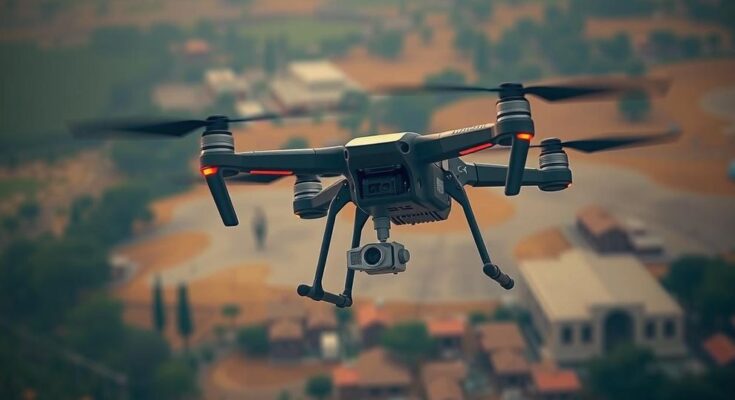The Sudanese army has accused the Rapid Support Forces of launching UAE-made drones from Chad, escalating concerns over foreign involvement in Sudan’s conflict. Evidence presented by Sudan’s government suggests these drone attacks are targeting regions within Sudan. Despite allegations of arms support, the UAE denies involvement, indicating a complex political landscape amid a humanitarian crisis wrought by ongoing violence.
The Sudanese army government has accused the Rapid Support Forces (RSF), a paramilitary group, of utilizing drones manufactured in the United Arab Emirates (UAE). These drones are reportedly being launched from Chad amid escalating hostilities in Sudan. Sudan’s Foreign Minister, Ali Youssef, presented what he described as compelling evidence linking the RSF to the aerial assaults, particularly emphasizing attacks aimed at the North Darfur state capital, El-Fasher, and Omdurman.
Minister Youssef asserted that investigations have validated the assembly of these drones in the UAE before dispatching them to Chad for RSF operations. This accusation aligns with previous claims from the United Nations, where experts suggested that the UAE was implicated in supplying arms to the RSF via Chad. However, the UAE has consistently rebutted these allegations, deeming them unfounded. Sudan’s UN ambassador has also contended that the UAE’s actions have considerably exacerbated the ongoing conflict.
Khalid Aleisir, Sudan’s media minister, articulated his discontent, describing the RSF’s actions as a blatant assault on Sudan stemming from both Chad and the UAE. He emphasized that the war has escalated dangerously due to external involvement and criticized these nations for prolonging the violence. Since the outbreak of the conflict in April 2023 between the Sudanese army and RSF forces, the humanitarian crisis has deepened dramatically, resulting in significant casualties and displacements.
Analysts express concern regarding the impact of foreign interventions, asserting that such external support may only serve to prolong Sudan’s suffering and further entrench the conflict, raising alarms for the future of peace and stability in the region.
The ongoing conflict in Sudan, which began in April 2023, has led to a devastating humanitarian emergency, with tens of thousands killed and millions displaced. The rivalry between the Sudanese army commanded by General Abdel Fattah al-Burhan and the RSF has drawn international scrutiny, particularly regarding external involvement. Allegations against the UAE have surfaced, suggesting that it has been arming the RSF, a claim the UAE has denied. Previous investigations by UN experts have supported concerns about foreign arms transfers fueling the conflict, raising essential questions about sovereignty and regional stability.
The accusations levied by the Sudanese government against the RSF regarding the use of UAVs assembled in the UAE heighten concerns over the escalating conflict in Sudan. With evidence presented to support these claims, and UN findings from the past reinforcing the narrative of foreign arms support, the situation becomes increasingly complex. As violence continues, the role of external actors such as Chad and the UAE is scrutinized, prompting urgent discussions on intervention and humanitarian assistance to alleviate the crisis. Additionally, the comments from Sudanese officials spotlight the delicate geopolitical dynamics at play.
Original Source: newscentral.africa




